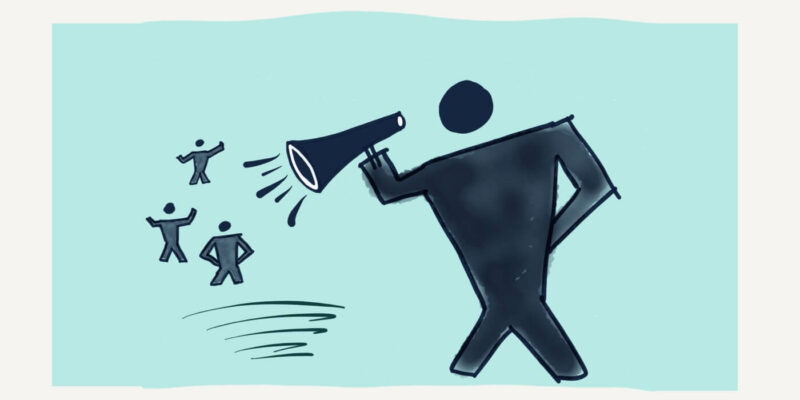I’m sure you’ve heard the expression face your fears.
Psychologically speaking, it’s pretty good advice:
- While avoiding your fears feels better in the moment, it kills your confidence in the long run—so your fears tend to grow over time leading you to be more and more afraid.
- On the other hand, facing up to your fears is scary at the moment, but it boosts your confidence in the long run, which leads to smaller fears and more confidence over time.
But there’s a nuance here that we often miss:
The decision to face or avoid your fears depends on the nature of the fear.
The obvious example of this is how we respond to so-called rational fears vs irrational fears:
- If you’re afraid to pitch your good idea during a meeting at work because you’re worried one of your coworkers will think it’s stupid, that’s not the most rational fear because nothing that bad will actually happen to you even if the worst-case scenario comes true. You won’t die or starve to death if your coworker thinks one idea during one meeting was kind of silly.
- But if you’re being attacked by a poisonous rattlesnake, avoiding that snake by running away is rational and therefore a perfectly good decision because there’s a real threat present.
So, the more nuanced—though, decidedly less catchy—phrasing of the old saying might be:
Face your irrational fears.
But there’s at least one more distinction that affects whether facing or avoiding your fears is a good decision or not…
What if you’re deceiving yourself about what you’re afraid of?
To illustrate this, let me tell you a brief story about a former client of mine and his spider issues…
When a spider phobia is not a spider phobia
I had a client once—we’ll call him Tom—who came to see me because of his spider phobia. He was terribly afraid of spiders to the point where he initially refused to even say the word spider out loud.
Interestingly, even though we treated his phobia pretty effectively and quickly, every few months he would occasionally have a “relapse” and all of a sudden “freak out” when he saw a spider. Eventually, I realized that these occasional relapses were actually a kind of cry for help.
Tom wasn’t very good at being emotionally vulnerable or expressive. So when some internal stressor became “too much,” he would end up having one of these spider phobia events because when he did, people around him—especially his spouse—became extra attentive, supportive, and emotionally available, which in turn helped him be more honest and vulnerable about whatever emotional struggle he was dealing with.
Over time, Tom and I came to see that while his spider phobia was very real, it only existed because it served the function of distracting him from his deeper fear of feeling alone with painful feelings and being unable to express them honestly. And occasionally, his “spider issues” catalyzed other people to be more emotionally attuned.
Over time, Tom was able to eliminate these relapses of the spider phobia completely by learning to be more emotionally vulnerable and more assertive about asking for emotional support. In other words, once Tom faced the real fear—fear of feeling alone with painful emotions—he had no need for the spider phobia, so it disappeared.
We all have our spider phobias
The story of Tom’s spider phobia might seem a bit extreme, but the underlying psychological dynamics are incredibly common.
All of us, in one way or another, tend to delude ourselves about what we’re really afraid of:
We scapegoat a superficial fear in order to avoid facing the real fear.
For example:
- You spend a lot of time lost in worries and catastrophizing about what would happen if your business failed. It’s very possible that what you’re really afraid of is the feeling of inadequacy that comes from imagining yourself taking your business to the next level and really going outside your comfort zone. So your fear of failure is really a way of procrastinating on confronting the real fear, which is your own perceived inadequacy at running a business.
- You spend a lot of time worrying about your 17-year-old’s academic performance and college admissions process—constantly checking in with them about their homework, projects, grades, plans, etc. Maybe the real fear isn’t that your child is suddenly going to flunk all their classes and not get into college so much as a fear of not knowing much at all about what your kid will be doing in a year or two. Once they’re away at college, the level of unknowns around how your child is doing will skyrocket and that terrifies you. So your fear of them missing an admission deadline or homework assignment is really a way of avoiding your deeper fear of the uncertainty that comes with our kids leaving home.
To be clear, I’m not saying this process happens all the time. Sometimes we are literally afraid of the spider or the business failing or our kid flunking out of Geometry.
But more often than we realize, we “use” one fear to avoid confronting another deeper and scarier fear.
And while understandable, this pattern of avoiding the real fear is dangerous because it usually leads to increasingly stressful and problematic behavior that impacts you and the people around you:
- If the only way to avoid your fear of inadequacy is to spend all your time lost in worries about fear of failure, you’re going to become a nervous wreck.
- If the only way to avoid your fear of uncertainty around your kid leaving home is to become a helicopter parent, it’s likely to stress you out and negatively impact your relationship with your kid.
Chasing the wrong fear is like continually putting a Band-Aid on an infected wound: It makes you feel like you’re doing something constructive, but all the while the real wound is festering and getting worse.
How to start facing your real fears
While there’s no one size fits all approach to facing your real fears, there is a bit of a shortcut that can help you zero in on what if any of your “real” fears might be.
Over the years working as a therapist, I’ve found that a surprisingly high percentage of these deeper fears basically fit into one of three categories:
- Helplessness
- Uncertainty
- Loneliness
When we get past the superficial fears and really drill down to what people are actually afraid of and avoiding, it’s almost always one of those three:
- They’re afraid to face up to feeling helpless and out of control.
- They’re afraid to confront how terrified uncertainty makes them feel.
- They’re afraid to acknowledge how truly afraid they are to be or feel alone and cut off from others.
So the first thing I would recommend is to start looking out for these three things in your own experience—helplessness, uncertainty, and loneliness.
Anytime you feel afraid—or find yourself engaged in some kind of avoidance behavior like chronic worry or reassurance-seeking—ask yourself:
Is there something deeper going on here? Is helplessness, uncertainty, or loneliness hanging out behind the scenes in this situation?
Now, this takes time and patience—and more than a little courage. But once you start to see this dynamic of deep fears and distractor fears playing out, it actually becomes hard to unsee it.
So what do you do once you become more aware of it?
My own experience is that these three deep fears—helplessness, uncertainty, and loneliness—are universal fears that we all have and will continue to have. You’re never going to eradicate uncertainty from your life, for example.
Instead, a more productive way to manage these deep fears is to ask yourself this questions:
What deep desires do these deep fears represent?
Very often, our deepest fears are actually windows into our deepest desires:
- Fear of helplessness → Desire for power or autonomy
- Fear of uncertainty → Desire understanding or mastery
- Fear of loneliness → Desire for connection or love
Instead of framing deep fears as bad things to be eliminated, look at them as signals pointing you toward greater self-awareness.
Your deepest fears aren’t disabilities; they’re teachers helping you discover what you really want from life.
What will you do?
At the end of her poem, The Summer Day, Mary Oliver asks a powerful question:
Tell me, what is it you plan to do
With your one wild and precious life?
As a therapist, I know as well as anyone how intimidating and scary it can be to actually confront those deep fears we’d rather avoid.
But the silver lining is that they may well be the best way to answer Mary Oliver’s question, which is, in some ways, the only question that really matters.
What if the terror of confronting our deep fears is the best way to shake ourselves into clarity about what we really want out of life—our dreams, ambitions, aspirations, and values?





32 Comments
Add YoursAbsolutely fabulous. Already it is provoking my thoughts to go in several new directions, so THANK YOU Nick!
You’re very welcome, Anna!
Wow…I will reread this and save it in my files and share it with others. Thank you for sharing such valuable information. I continue to grow each and every day! I’m grateful and blessed to have this day! Enjoy it!
Glad it was helpful, Suzette!
I really appreciate your motivational statements on how to overcome fears of different perspective.
Thanks, Eddie 🙂
Thank you! I am seeing some of my own fears and insecurities a bit differently now. This is very helpful.
Glad it was helpful, Margaret!
Nick, everything you write about is so relevant to me and just about everyone I know! And you always convey the message that it’s ok, this is what it means to be human — and here’s another way you might look at this. A big thank you for putting these excellent articles out there for all of us.
Thank you, Amy 🙂
A (personally) timely article—something that I’ve been recently pondering more often.
I have a question regarding, “Anytime you feel afraid—or find yourself engaged in some kind of avoidance behavior like chronic worry or reassurance-seeking—ask yourself: Is there something deeper going on here? Is helplessness, uncertainty, or loneliness hanging out behind the scenes in this situation?”
I’ve been asking myself something similar to this for years. What do you do if you can’t access the underlying issue or fear? How do get to the root of anxiety and negative thoughts if the cause always feels vague?
Thank you. This is very helpful not just for myself but to understand others
Thank you Nick a few years ago I had a serious car accident and suffered from PTSD I was eventually treated with EMDR and was making good progress. Then I was diagnosed with breast cancer, the psychologist working with me said I had two traumas to deal with close together and it may manifest in a new phobia. Guess what I suddenly became terrified of spiders. Thank you for this enlightening article
Thanks for this brilliant article Nick. I started analysing my fears, and hope to be able to address the true fear.
Thank you Nick – very helpful perspective, as usual 🙂
This comment is going to be difficult to confront. I think this article is incomplete.
At the end of this article two questions come to mind whose answers would have been a great addition to the ending of your essay.
What do I do now that I have this self-awareness of my greatest fears?
Where can I go to get resources on how to confront these fears that fall into the 3 catagories of Helplessness, Uncertainty, and Loneliness?
I really appreciated your articles observation that Helplessness, Uncertainty, and Loneliness are main contributors to avoidant behavior. It helped me realize that one of the drivers to my avoidant behavior of procrastination was just the uncertainty of completing the task I was procrastinating on.
Thank you for taking the time to write this article and I appreciate its insights.
Superbly presented in such a way I feel enlightened. The line, next time you find yourself afraid—or engaged in some kind of avoidance behavior like chronic worry or reassurance-seeking… the lightbulb flicked on, thankyou so much… amazingly helpful as always
Greetings Nick, a beautiful article…enhanced me totally about your analyisis.Definetely going to share in my community. I’m a regular follower of your articles and most of the times, use your way handling situations.One more request can you post your articles on sobriety, as I have to share this too..can you personalize this to me on my mail..More to pour from you…Thanks a ton…!!!….hds
It’s true, fears are invisible chains that hold us back from truly living, learning about the truth, how to apply it, that inpowers us to think, know, choose, the truth that will set us free, I’ve been bond by fears for years 60,remember it’s never to late to get help from great people, we are born free, but learn to be imprisoned, from false information, starting in childhood, from parents, people who are imperfect, but usually wanted the best for us, but they only can teach what they learned, even if it’s subcomcous level, so many people are living day to day, not knowing there’s a great better way to see life, and grow and learn how to apply facts about life, and not only improve their own life, but improve other people life’s, Thank You sir, from the USA, ????????
Thank you for sharing this Nick, good article ! When irrational fear comes, it´s hard to go through life and to think properly. But there is always hope. I have learnt that the hard way, and reading the Bible, specially the book of Psalms has helped me a lot. We need to add faith to the psycology.
“So your fear of failure is really a way of procrastinating on confronting the real fear, which is your own perceived inadequacy at running a business.” Could you please tell me this fear( inadequacy at running a business” is a type of helplessness or uncertainty?
Interesting article. When you provide examples, so many seem to be trivial. Do people really worry about whether their bosses like their presentations? Tell me how to stop worrying about winding up a bag lady, not having real friends or family and worrying about aging alone.
OMG! I think you are a me! LoL
We seem to have the same fear?
Fear is appropriate for things you can do something about like snakes and spiders; but for things woven in with a past that maybe gets tangled with your present circumstances talk to someone other than your own worries.
Oh i really love this, I’m trying to figure out a break through my emotional pain from the past, and this should definitely help in some ways
How do I begin to address my fears / deepest desires in practical ways?
How I can do it?
Thank you for the insightful article! +1 on what to do next?
Nick your articles are challenging and life-transforming! They make me search my soul and give me hope. Hope to believe that I can one day be “Emotionally Stable, Secure and Strong”! Your words of wisdom and discernment are making a difference in my life! I’m so grateful and thankful. Min. Pat Reese
This article is a revelation. Certainly for me. The apparent fear is masking (or even masquerading?) the real fear.
The summary of 3 probable causes make so much sense.
Observing that alone creates awareness and awareness reduces fear.
As ever Nick, you have enlightened me amongst many.
You have a great gift of making the complex simple.
Keep up the wonderful work, you may never always get to hear how much of a difference it makes – but it does. Definitely.
Many many thanks,
Conor
This really hit home! I never thought about my fear of public speaking being a cover-up for a fear of failure. Now I understand why I procrastinate so much!
Thank you for sharing! Your article is not only useful but also inspiring. I’ve learned a lot and can’t wait to apply this knowledge to my life.